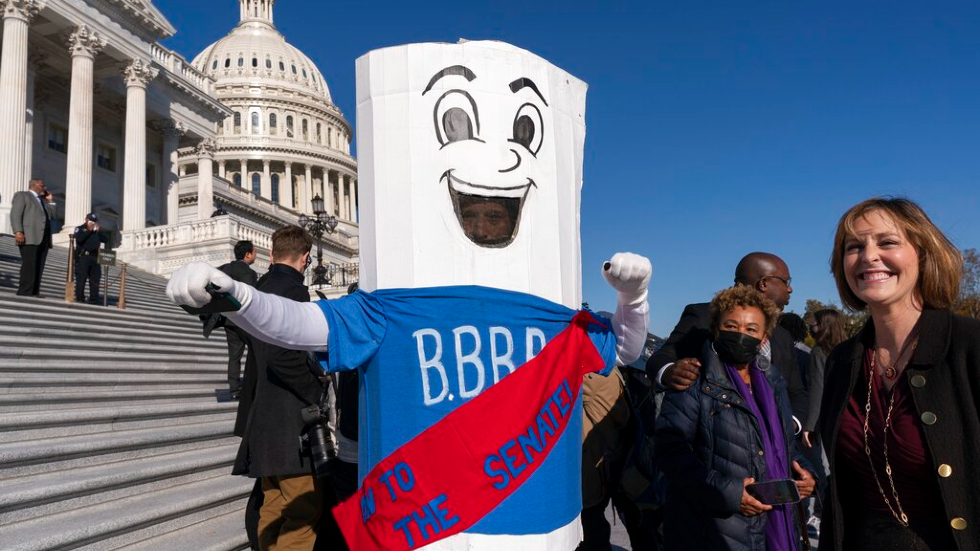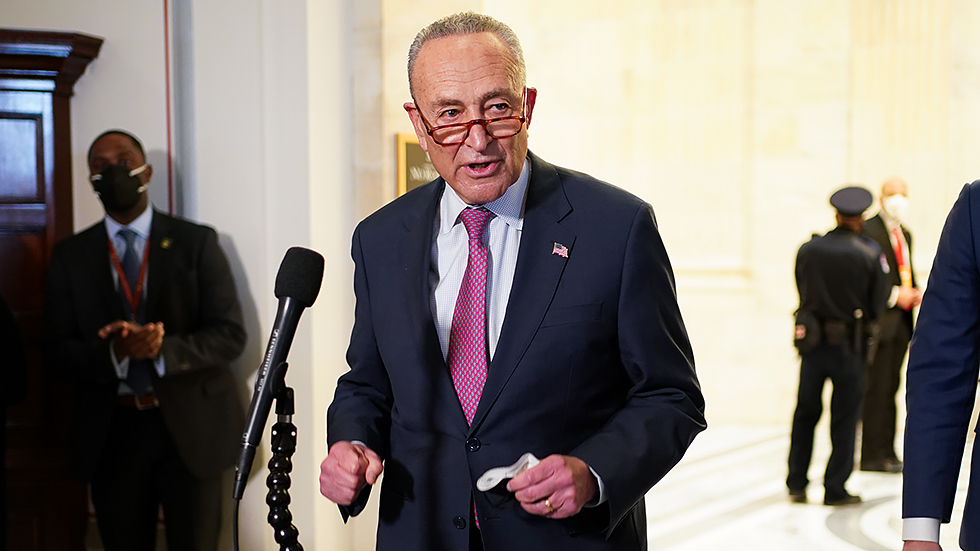On The Money — How Breyer bailing blocks Build Back Better

Happy Monday and welcome to On The Money, your nightly guide to everything affecting your bills, bank account and bottom line. Subscribe here: digital-stage.thehill.com/newsletter-signup.
Today’s Big Deal: The looming fight over President Biden’s new Supreme Court nominee could delay his major economic bill. We’ll also look at a potential government shutdown, what you may have in common with Odell Beckham, Jr. and momentum for Starbucks unions.
But first, big news for Wordle devotees.
For The Hill, we’re Sylvan Lane, Aris Folley and Karl Evers-Hillstrom. Reach us at slane@digital-stage.thehill.com or @SylvanLane, afolley@digital-stage.thehill.com or @ArisFolley and kevers@digital-stage.thehill.com or @KarlMEvers.
Let’s get to it.
Breyer latest complication for spending bill

Supreme Court Justice S. Breyer’s plans to retire have thrown another curveball into the winding efforts to get the cornerstone of President Biden’s agenda passed in what could be the final months Democrats have full control of Congress.
- Appointing Breyer’s replacement to the court is an undeniable win for Biden and the Democrats, some of whom had pleaded for the 83-year-old justice to step down and make way for a younger judge to cement the liberal wing of the bench.
- But the timing of the announcement, nine months before the midterm elections, could make it more difficult for Biden and Democratic leaders to negotiate and get his signature climate and social spending proposal, Build Back Better, passed and signed into law.
“At some point, that nomination process is going to consume all of the oxygen on Capitol Hill in the Senate,” said Jim Manley, a former aide to the late Sen. Harry Reid (D-Nev.). “It doesn’t mean Build Back Better is done, but it’s just another problem that has to be dealt with.”
Morgan Chalfant and Brett Samuels tell us more about the road ahead here.
OMINOUS OMNIBUS
Congress in jeopardy of missing shutdown deadline
Congressional negotiators are in danger of missing the Feb. 18 deadline for passing an omnibus package of the annual appropriations for fiscal 2022.
A shutdown is unlikely, but members of the Senate Appropriations Committee from both parties warn that if negotiators blow through the mid-February deadline, it increases the likelihood that President Biden will have to settle for a yearlong stopgap funding measure to keep the government open.
- Another stopgap would prevent Biden from putting his own stamp on department and agency budgets while Democrats control Congress.
- As a result, Senate Democrats right now are prioritizing passage of the omnibus spending bill ahead of the stalled Build Back Better Act.
The prospects don’t look good so far. One Democratic aide told The Hill that it would be “extraordinary” if the omnibus package gets wrapped up by Feb. 18, while a Republican aide said that “it’s gonna be hard to get it done” by that date.
The Hill’s Alex Bolton has more on the omnibus push here.
STARBUCKING THE TREND
More than 50 Starbucks stores now petitioning to unionize
Employees at more than 50 Starbucks locations have petitioned to unionize shortly after workers at a Buffalo, N.Y., store first voted to do so last month.
Workers United, an affiliate of the Service Employees International Union that is organizing the Starbucks push, said Monday that an additional 15 locations filed for union elections with the National Labor Relations Board.
- As of Monday, 54 Starbucks locations in 19 states have petitioned to unionize less than two months after the initial groundbreaking unionization vote.
- Starbucks has pushed employees to reject labor unions but has said that it will “bargain in good faith” with stores that vote to organize as required by federal law.
Starbucks executives publicly predicted that the Buffalo vote would lead to more union elections but it’s unclear if they expected the movement to spread so quickly. Earlier this month, a separate Buffalo location became the second Starbucks to unionize following a 15-9 vote.
Karl has more on the Starbucks movement here.
BITCOIN BLUES
Crypto volatility hits banks, celebs and everyday investors
The value of most cryptocurrencies have plummeted in recent weeks, wiping out billions of dollars of wealth. And instead of mostly harming cryptocurrency enthusiasts, like previous crashes have, the impact was felt widely.
Cryptocurrencies have seen their popularity skyrocket during the pandemic, pulling in countless celebrity endorsements and being integrated into more asset portfolios.
- Cryptocurrency and blockchain based tech like nonfungible tokens (NFTs) are now showing up everywhere from late-night talk shows to Matt Damon commercials.
- Athletes like Odell Beckham Jr. and mayors like New York’s Eric Adams (D) have even chosen to have their salary converted into cryptocurrency.
While banks and brokers once scorned cryptocurrencies, a growing number of them now offer purchasing and custody services. The boom has also helped propel several start-ups, including Robinhood, to new prominence and has even pushed some blockchain-centric firms to seek national banking licenses.
That has made the price drops of the last week, where both bitcoin and ethereum plunged over 40 percent from their highs, all the more damaging.
Good to Know

Senate Majority Leader Chuck Schumer (D-N.Y.) is applying pressure to lawmakers to make headway on annual government spending legislation with just weeks to go before current funding is set to lapse.
Schumer said in floor remarks on Monday that he plans to sit down with Democratic lawmakers later this week “to discuss the state of negotiations” to pass an omnibus package to fund the government within the next few weeks.
Here’s what else we have our eye on:
- A number of Republican Senate candidates running on anti-Big Tech platforms have stock holdings in the same companies they are vowing to hold accountable if elected to Congress.
- The White House released a guidebook to help state and local governments access the bipartisan infrastructure law’s 375 programs.
- President Biden’s nominee to lead the Food and Drug Administration (FDA) made significant ethics concessions to Sen. Elizabeth Warren (D-Mass.) in an effort to secure Democratic votes ahead of his confirmation.
- The AFL-CIO endorsed a bill to help the U.S. compete with China by boosting domestic semiconductor production and investing in scientific research and development.
That’s it for today. Thanks for reading and check out The Hill’s Finance page for the latest news and coverage. We’ll see you Tuesday.
Copyright 2023 Nexstar Media Inc. All rights reserved. This material may not be published, broadcast, rewritten, or redistributed. Regular the hill posts







